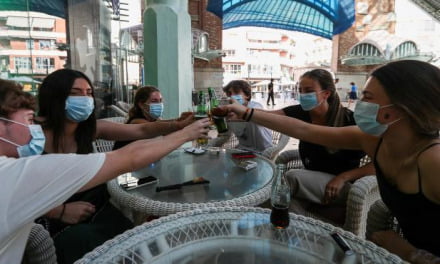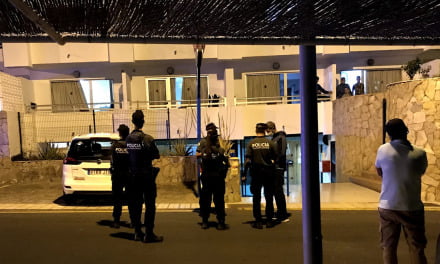 The United Nations Refugee Agency (UNHCR / ACNURspain) have this week announced that they will be sending a specialist team, to the Canary Islands, to work on this year’s worrying increases in migrants who risk their lives in open boats trying to reach the archipelago. It is thought that nearly 200 people have been lost already this year, having failed to make landfall. Pressure is quickly mounting on the islands’ ability to patrol, retrieve, accommodate, then identify those who do survive the journey, and the need to accurately assess who among them might be eligible for protection or asylum under agreed EU law and international treaties and commitments.
The United Nations Refugee Agency (UNHCR / ACNURspain) have this week announced that they will be sending a specialist team, to the Canary Islands, to work on this year’s worrying increases in migrants who risk their lives in open boats trying to reach the archipelago. It is thought that nearly 200 people have been lost already this year, having failed to make landfall. Pressure is quickly mounting on the islands’ ability to patrol, retrieve, accommodate, then identify those who do survive the journey, and the need to accurately assess who among them might be eligible for protection or asylum under agreed EU law and international treaties and commitments.
Editor thoughts:
These problems, presented by a rapid increase in people traffic, were being noticed last autumn. In 2020 there has been an already more-than six-fold increase in the number arriving over the same period of last year.Things are further exasperated by the ongoing global pandemic. Corona virus has really only just started to affect the African continent, a mere 200km from our shores (at least for those with the privilege of travelling in straight lines); and early reports suggest a general blasé lack of concern among wider populations, having waited for the crisis many find themselves comparing COVID-19 to the, so far valiantly suppressed, still dreadful, deadly potential of those other pathogens such as Ebola, among numerous other more familiar fevers and ailments of dire consequence.
Couple that with a near total lack of data about infection rates along the various migrant routes, nor reports from among those paperless, poverty stricken peoples, barely subsisting. Many of whom may travel thousands of kilometers, over months and months, to work manual labour, for unscrupulous gangs along the way. Much of the time without wage nor welfare, taking years, just to earn one opportunity to risk everything.
In the hands of unhurried men, upwards of €1000 and more per head.
To be cast out onto an ocean, in an open boat. Aboard a Patera. With just what you have been able to carry. Among complete strangers. Wives separated from husbands. Mothers from children. Brothers from sisters. All in search of something more than the utter lack they had to look forward to, in a place they wish they were not born. Some of them war torn, often without mercy. Corrupted or simply brutalised.
Unforgiving.
To be tossed on unruly waves. Towards hope.
 UNHCR announced their decision, to reinforce their presence, coinciding with a four-day visit to the Canary Islands from their representative in Spain, Sophie Muller, who arrived at the weekend and began this Monday to gather first-hand information, and communicate recommendations in the context of international protection, taking into account the increase of arrivals by sea over recent months. During the first half of 2020, this ocean has landed 2,700 people to our coastlines. That is as many as in all of 2019 put together, and that during what is usually the quietest time for those who attempt that perilous journey.
UNHCR announced their decision, to reinforce their presence, coinciding with a four-day visit to the Canary Islands from their representative in Spain, Sophie Muller, who arrived at the weekend and began this Monday to gather first-hand information, and communicate recommendations in the context of international protection, taking into account the increase of arrivals by sea over recent months. During the first half of 2020, this ocean has landed 2,700 people to our coastlines. That is as many as in all of 2019 put together, and that during what is usually the quietest time for those who attempt that perilous journey.
Sophie Muller is here to learn about our situation, and the resources currently available on Gran Canaria, Fuerteventura and Tenerife. It is her first visit to the islands since she took office in October.
Throughout this week, she will hold meetings with various authorities on the islands, as well as with various institutions and NGOs, to analyse the situation that greets those who arrive by sea from West Africa, “among which are immigrants and refugees who have fled conflict situations in the Sahel.”
 “It is a long and dangerous route on which men, women and children, including some traveling alone, embark, on which it is estimated that at least 182 people have died so far this year” UNHCR stressed in a statement.
“It is a long and dangerous route on which men, women and children, including some traveling alone, embark, on which it is estimated that at least 182 people have died so far this year” UNHCR stressed in a statement.
With plans to have a new team in the Canary Islands, UNHCR have made clear that the organisation offers to make “its experience in managing these mixed flows available to the authorities at the main points of entry throughout southern Spain and offers its support and collaboration in order to approach the current challenge from an international protection perspective”.
This announcement is welcome, as are the outstanding members of the UNHCR whose efforts too often go unrecognised nor properly supported. However this is not simply a refugee problem (as if refugee problems could ever be simple…).
Economic migration is to be surely expected when such huge disparities exist in the world, and between neighbouring populations, and while so little effort is put in to addressing the problems of our nearest neighbours, particularly considering Spain’s long colonial past in the region, and its sudden abandonment in 1975, some might say, that a more serious, holistic and humane approach is long overdue.
Spain must rethink its attitudes towards Africa, and offer guided pathways to improving expectations, collaboration and education, in Spain as well as in Africa, to foster an over arching sense of cross-border community that can benefit us all moving forward. Of course there are those who through thinly veiled racism seek to blame the migrants. That is to blame the victim for the crime. Badly treating the symptoms and never the cause. Right now, we all turn our backs, especially the immigrants of privilege, so-called expats, invariably white Europeans, firmly facing away until some dark skinned strangers turn up on our beaches. While for many that may have been a functional response in the past, in this new age of global pandemic, instant information and not nearly normality, we must comprehend that no virus will respect our borders, or cultural difference, any more than it will care for our material property. To fail to at least try to improve the aspirations of those who so naturally envy our lives of plenty, here on Europe’s most southwesterly edges, while they have opportunity for naught, is to make more and more attractive even the most life threatening of journeys, if there is any hope of being able to gain some small part of what those others, otherwise, could never hope to have.
We are now at a crucial stage in a pandemic response, having here been more successful than most in suppressing infection rates, however, too little attention is being paid to the sudden uptick in pateras arriving to the islands since the end of last summer, 2019, and we are now again at peak migration season, when we are likely to see more and more people attempting to reach these islands, many will succeed, too many will fail.
To date more than a third of all this year’s irregular migration to Spain is being handled by The Canary Islands, a more than 600% increase in people over 2019, however the various NGOs and governmental organisations appear to have been very slow to recognise that we are in a most precarious situation, we must act. We are between an ocean and poor place, with funding meant to try to curb migrant departures from originating coutnries having increased by 240% this year it seems clear that there is a huge disparity between deployed boots on the ground and the actual size of this growing issue.
Those with a long enough view will still remember the summer of 2006. Ten years before the so-called “migrant crisis” we had The Canary Migrant Crisis. 32,000 migrants, at that time, half of whom were Senegalese, arrived on these shores, following a short-sighted, if well meaning, attempt to regularise large swathes of the undocumented foreign community present in Spain. It was a starting gun to a manic dash from West Africa to try to enter Europe, at least 6000 people died in the effort, of which we know. Probably a lot more than that. That woke everyone up suddenly, and resulted in huge amounts of extra funding and collaborative agreements between Spain and several West African governments which allowed much more work to happen in those countries of origin. This resulted in less than half attempting the journey the following year, and by 2010, less than 200 were found to be trying to make the crossing.
But the world has continued turning, and everything has changed more than once more. If we don’t take some positive decisive action, we could easily find ourselves at the dawn of the next big surge in migration, and with it the potential for divisiveness, racism, fear and bad decisions, not to mention a virus we thought we had got under control. It’s not under control, by any stretch, but last thing we need is “others” to blame. It’s a real danger.
That all said, it is worth pointing out that with the exception of a small abandoned boat, big enough for four or five, found on the coast near Arguineguín this Tuesday morning, with no sign of who, or how many, if any, may have been travelling in it, Canary Islands coast guard, and the Search And Rescue teams, do an extraordinary job of detecting and intercepting pretty much every vessel that manages to get to us.
Migrants, over recent weeks and months, have not only been greeted by the usual Red Cross volunteers, but immediately assessed and tested for COVID-19 before being put directly into quarantine isolation, and repeatedly tested every two days for a minimum of a fortnight. This ironically means that all African migrants arriving in pateras are likely to be the lowest risk visitors we have right now coming to the islands. There is no official testing whatsoever of our European tourists, now tentatively starting to return, with masks in their hands, and little more than temperature scans, waving an app based declaration, to assure us that those long overdue holiday makers have taken all the right precautions to ensure they are not bringing anything nasty in to our largely uninfected populations. It’s a bit of a joke, right now. Anyway, here’s hoping it will all be ok. Though hope may be no strategy at all, it is something we can all recognise. We want hope to protect us.
While several migrants in recent weeks have tested positive for corona virus, we can be sure we have detected pretty much every one of them. We will not likely discover any carriers among the tourists until it has already been passed on. Let’s hope everyone voluntarily keeps washing their hands and wearing their masks while spending their euros to enjoy the sun, sand and sea we offer, so tempting to so many peoples of every shade and socio-economic background, if for sometimes very different reasons.  While overall numbers of migrants reaching Spain have dropped over the last two years, already more than 20% down on last year nationally, due to ongoing work being done on all the Mediterranean coasts, and with various northern African countries, to try to prevent boats crossing or even leaving in the first place, the simple fact is that this has applied huge pressure to follow a much more dangerous Atlantic route, making us more attractive, resulting in an inevitable increase in people attempting the Canary crossing.
While overall numbers of migrants reaching Spain have dropped over the last two years, already more than 20% down on last year nationally, due to ongoing work being done on all the Mediterranean coasts, and with various northern African countries, to try to prevent boats crossing or even leaving in the first place, the simple fact is that this has applied huge pressure to follow a much more dangerous Atlantic route, making us more attractive, resulting in an inevitable increase in people attempting the Canary crossing.
Edward Timon .:.











